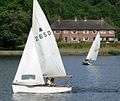Trimpley
Trimpley (grid reference SO793784) is a hamlet in the parish of Kidderminster Foreign. It lies on the ridge of Shatterford Hill, north of Wribbenhall and east of Habberley. The village (such as it is) lies along Trimpley Green, a small common. At the northern end of Trimpley is the ancient wooded area of Eymore Wood, now bounded on its west by the Severn Valley Railway, beyond which lies Trimpley Reservoir.
South of Trimpley Green lies Wassell Wood (now owned by the Woodland Trust). This wooded hill is surmounted by an earthwork enclosure of unknown date. The name "Wassell" is derived from the Anglo-Saxon "Weardsetl" meaning a watchplace. This was the westernmost of a chain of such watchplaces, also including Wassell Grove (near Wychbury Hill), Waseley Hills and Wast Hills in Alvechurch.[1]
Hoarstone Lane and Trimpley Lane, through the hamlet are probably part of the Micclan strete (great made-road), mentioned in the Anglo-Saxon bounds of Wolverley. This may have been part of an ancient road from Gloucester and Worcester to Chester.[2]
In 1357 John Atte Wode, an usher of the king's chamber,[3] obtained a licence to maintain a priest at Trimpley.[4] The medieval chapel, founded by endowment as a chantry chapel, was dissolved at the Reformation. The present Trimpley Church was built in 1844 in a Norman style as a chapel of ease.[5]
%2C_Worcs_(geograph_3909840).jpg) The village pond
The village pond Trimpley Reservoir
Trimpley Reservoir.jpg) Alpacas at Trimpley
Alpacas at Trimpley Inside the Earthworks in Wassell Wood
Inside the Earthworks in Wassell Wood.jpg) Holy Trinity Church
Holy Trinity Church
References
- P. W. King, 'The Minster Aet Sture in Husmere and the northern boundary of the Hwicce' Transactions of Worcestershire Archaeological Society 3rd ser. 15 (1996), 85.
- P. W. King, 'Some roads out of north Worcestershire' Transactions of Worcestershire Archaeological Society 3rd series 20 (2006), 95-96.
- 'Kidderminster: Churches and charities', Victoria County History, Worcs. 3 (1913), pp. 173-179. Date accessed: 5 February 2010.
- Driver, J. T. Worcestershire Knights of the Shire 1377-1421 Transactions of the Worcestershire Archaeological Society. Third Series Vol 4 1974 p20
- 'Kidderminster: Churches and charities', Victoria County History, Worcs. 3 (1913), pp. 173-179. Date accessed: 5 February 2010.